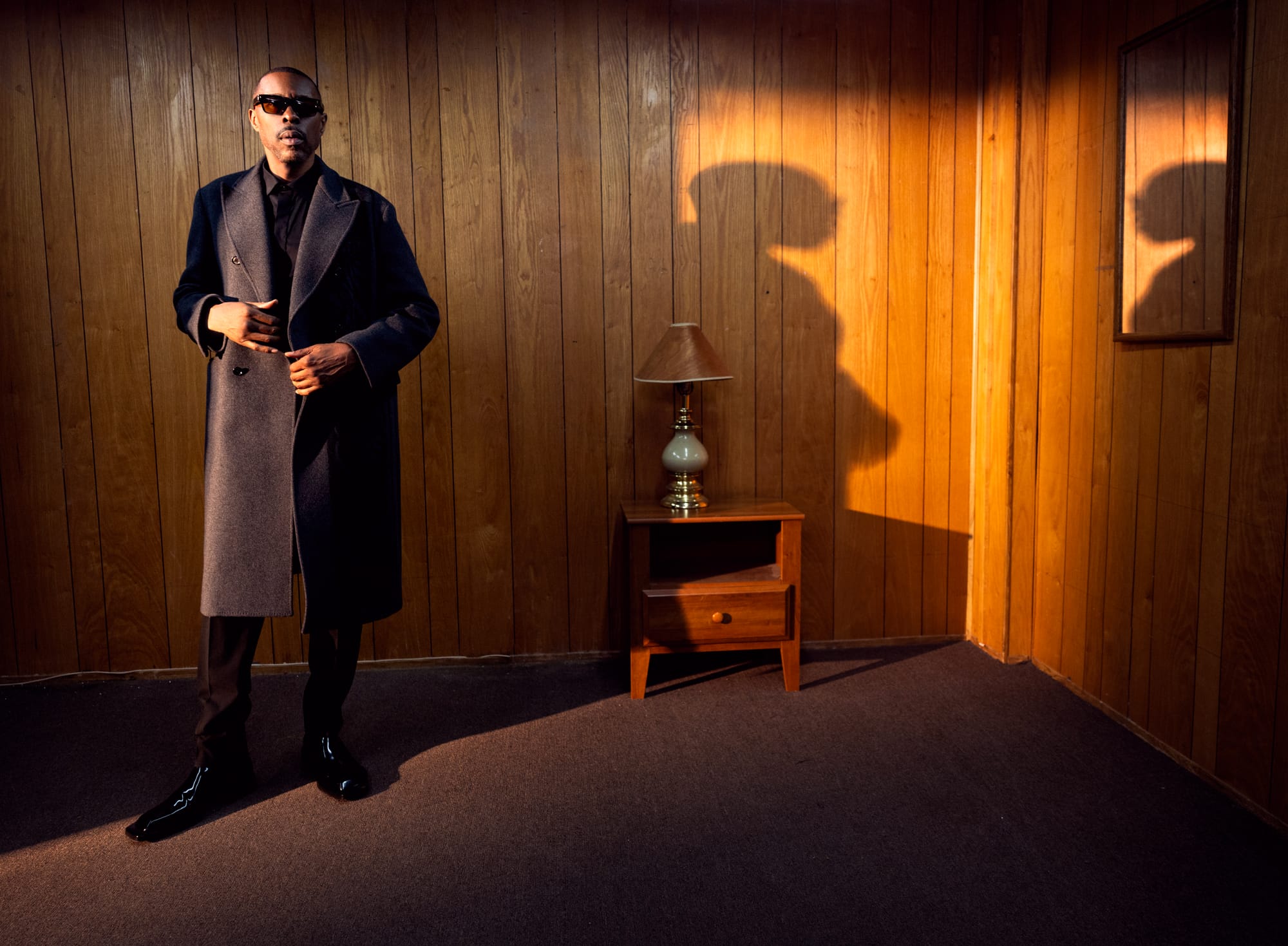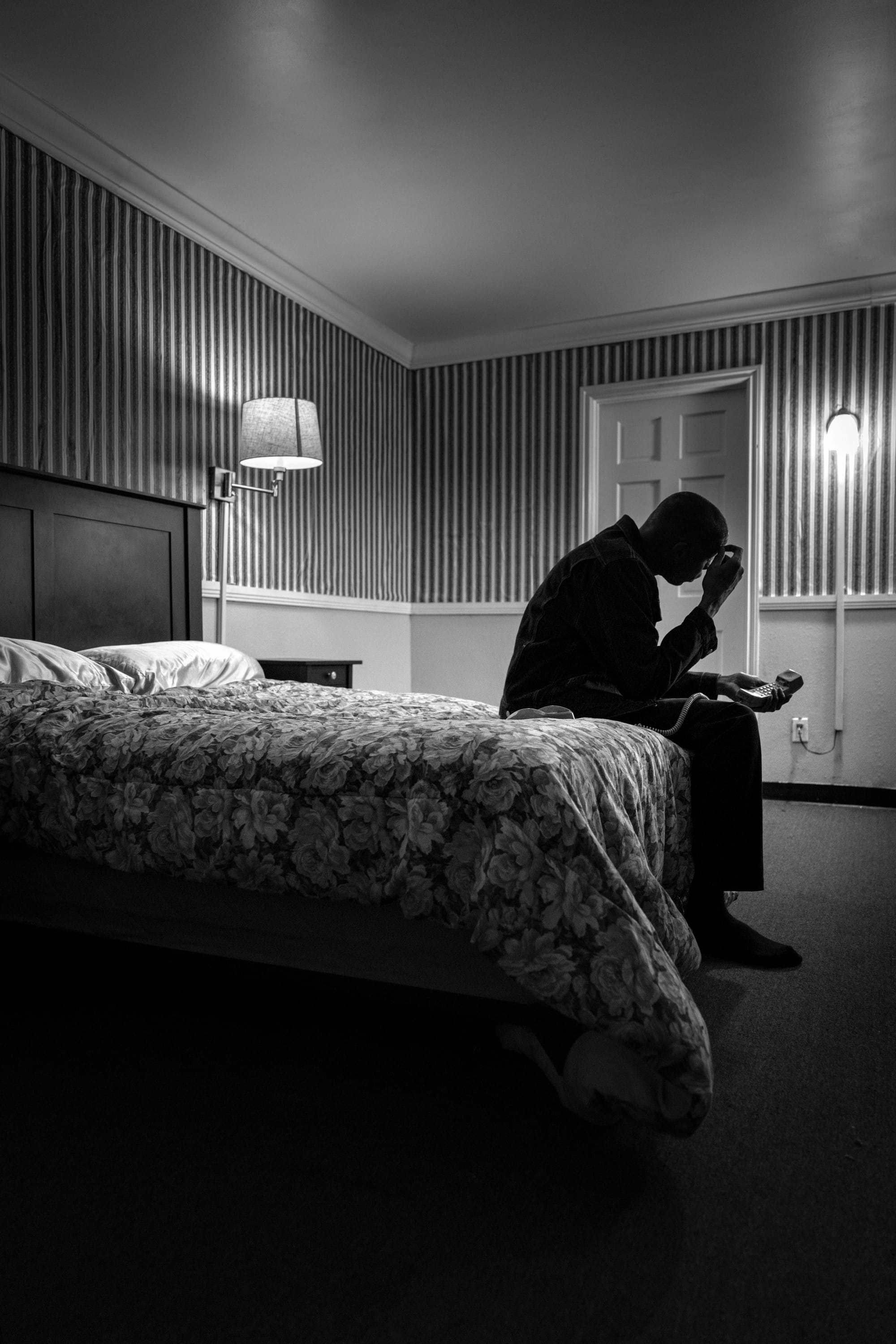
Wise Advice From Your New Favorite TV Dad, Wood Harris
Playing a cool dad with a side of stern in Mara Brock Akil's Forever, the Chicago native shares bits of wisdom to live by
Wood Harris is playing himself.
On a 70s-style set in North Hollywood, the wiry actor, who is somewhat of a master when it comes to playing others, is tasked with being a 55-year-old father of two who grew up in Chicago with humble beginnings but had a gift and smarts to get accepted to NYU’s storied film program.
He’s nailing the role.
Seated in a kitchen nook with turquoise-colored seating that has seen better days, the actor is looking for some inspiration to get him through the day’s third shot. A Too $hort song from the early 90s catches his ear. He politely asks that the person controlling the audio stay right there.
And action.
Harris peeks over every now and then as he’s expecting a visit from his daughter, who has aspirations to do something in the entertainment business. When she arrives he’s attentive between his takes, asking her if she’s eaten. He switches from focused thespian to full-on Papa Wood taking care of his little girl.
In Mara Brock Akil's Forever (Netflix), a coming of age series that centers two deeply-in-love teens, Harris plays a father to two boys. He delivers Akil’s warm dialogue as if it was tailor-made for him. Akil’s writing is passionate. It has rhythm and flow. Never robotic.
Harris, who coached Akil’s son when he played YMCA basketball, says that the writer and showrunner’s superpower is relatability.
“Mara knows how to put together relatable circumstances, and give you the feelings she wants you to have,” said Harris. “She knows how to make you feel.”
Harris’ character is a cool dad with a side of stern — a practical parent that isn’t overbearing or preachy. When he finds out his son is looking to date seriously he has his version of the talk and incorporates props. Wood hands his son a cucumber and a condom and asks that he place the prophylactic on the fruit for accuracy. Then he ramps up the stakes by asking him to repeat the action in the dark. His teenage son, played by Michael Cooper, Jr., fumbles.
And cut.
Although Harris feels right in this role, his past filmography shows a more intimidating and aggressive character actor. He’s the beloved Ace, modeled after Harlem drug legend Azie in Paid in Full. The film, overseen by Dame Dash and Harvey Weinstein, underperformed but received the hood classic stamp of approved post cinema release. He also played gangsta-with-a-code Avon Barksdale on David Simon’s The Wire, a show widely considered to be the best television series ever written. And most recently, Harris portrayed Hall of Famer, Spencer Haywood, on the criminally underrated Winning Time: The Rise of the Lakers Dynasty (HBO). Real-life Spencer Haywood was pleased with the performance, unlike many of the other Laker legends adapted.
Harris, who will also appear in Leonardo DiCaprio’s One Battle After Another in September, has lived and spent decades in Hollywood. Over a 45-minute Zoom, LEVEL asked the veteran to share some of his wisdom with us — with you.
We start the sentences; he finishes.
End scene.
My dad was a bus driver. My mother was in and out of work. We grew up with powdered milk. My kids ain't seen no damn powdered milk or government assistance. You know what I'm saying? We had government cheese. That shit was cold though. That shit made a cool ass grilled cheese.
My son is a lawyer, but check this out. He passed the bar before graduating, dog. Passing the bar is the most difficult here in California.
When I was a little kid, Don Juan was the neighborhood pimp, and my dad used to see them on the street. The generation before Don Juan never saw prostitution like that — gaudy, all that green and gold, rhyming and all that stuff was new to people like my dad. He used to go up to Don Juan and this other pimp who called himself God, and he was always trying to get them off the street, but they looked at my old man [like] he was square.
I heard a daunting statistic the other day. 83% of actors make $23,000 a year. So they have other jobs. I'm both blessed and freaking lucky dog.
Money is very important. It’s a tool with which you pay your utilities, support your family, and your lifestyle. But I don't use money to amplify who I am to the world.
Can money bring you happiness? I told you we grew up poor and I wasn't unhappy. It was scary. I was struggling. It was bad. But was I unhappy? No, I wasn't. I've had more difficulties with money than I did without it.
I did Ant-man, the Marvel movie, and Paul Rudd said to me one time, “Wood, you seem happy.” He hadn’t been around me a long time. He said, “do you think people are born happy?” It was an odd question at the time, but a good question. I don't have a definitive answer, but maybe so.

I'm unapologetic about my approach towards health and wellness.
Research can lead you down a rabbit hole and change your life. I'll give you an example. I knew Dr. Sebi. Prior to meeting, I didn't know much about him. He changed my life from the way that I understood medicine versus holistic approaches. He changed my eating habits. He was 70-something when I met him and was about my height — about 6’3”, 6’4”. He could drop to the concrete on his knees and pick himself back up without his hands, an elderly man. I can't even do that. So I heeded his advice about food and health and wellness, and it changed my life and my kids' lives. Research can lead you to what you're looking for.
The Wire was intended to be a cop show. That's why season two is so different. The bad guys were going to change every season. It was going to be like Law and Order. The story goes that HBO was petitioned on Avon and Stringer. “Those characters, the bad guys bring them back.” So they brought 'em back and made the show about that.
People think that villains like Avon, aren't that smart. You think of them as just tough, and in your opinion, they make bad decisions, but you never really notice how smart some of those guys are. What I wanted to do was display that. I wanted Avon not to just look like a foolish hood dude who did a bunch of mean stuff and made money.
I'm not a street hustler because I'm an intellect.
The important thing about failing is acceptance. If you don't accept a failure, then you're still in the state of failing.
Young actors like looking up to me the way I did Denzel and Lawrence Fishburne. New Edition was one of the first experiences where I learned that. They came on so excited to work with me. I was like “wow”.
I'm a little bit introverted, just slightly. I don't hob knob with folks too much. I don't do a whole lot of networking and stuff like that. So when I learned that I'm an admired talent it felt good.
My father taught me respect. He taught me that a man has to support his family under all circumstances. A man has to get up, work and bring home the bacon.
You just need a few things. Great company, something decent to eat, some warmth when it's cold, some cool when it's hot. Life is simple, bro. I try to live the most simple life I can.